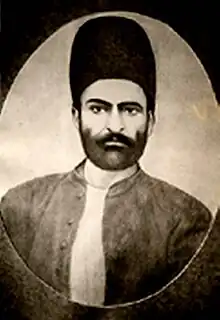Shamlu
The Shamlu tribe (Persian: ایل شاملو; Azerbaijani: Şamlı, Şamlu), also known as the Shamli tribe, was one of the seven original and the most powerful Qizilbash tribes of Turcoman origin in Iran.

Heydar Gholi Khan Ghiaï-e Chamlou I
.jpg.webp)
Heydar Gholi Khan Ghiaï-e Chamlou II
List of the Khans of Shamlu
- Ahmad Sultan Shamlu
- Abdu Beg Shamlu ( Father in law of Ismail I )
- Husein Khan Shamlu ( The most powerful qizilbash Khan, executed by Shah Tahmasp in 1534)
- Hossein Khan Shamlu ( Governor of Lors Pushtkuh- Province of Lorestan )
- Hasan Khan Shamlu
- Mirza Vali Khan Shamlu (Governor)
- Ali Gholi Khan Shamlu (aka Haji Ali Qizilbash Mazandarani Governor of Khorassan in 1576 and chief of the armies under Shah Abbas I en 1588 )[1]
- JĀNI BEG KHAN BIGDELI SHĀMLU(d. 1645), ishik-āqāsi-bāshi (master of ceremony) and qurchi-bāshi (head of the tribal guards) under the Safavid Shah Ṣafi I (r. 1629–42) and Shah ʿAbbās II (r. 1642–66).[2]
- Sinan Khan Shamlu (Ambassador of Shah AbbasI to Emperor Rudolph II of Habsburg)
- Muhamad Gholi Khan Bigdili-e Shamlu
- Dormish Khan Shamlu (Brother in law of Shah Ismail I and Governor of Isfahan )
- Murteza Gulu Khan Shamlu-Ardabili (invented a style of calligraphy called "Shikasta Nastaʿlīq")
- Abbas Gholi Khan Shamlu-Shahsevan (Governor of Herat, 1812)
- Mu'min Khan Shamlu (1699–1707, Grand Vizier )[3]
- Mohammed Zaman Khan Shamlu (1711)
- Muhamad Ali Khan Bigdili-e Shamlu (c.1722, Grand Vizier )[2]
- Zaynal Khan Shamlu
- Murshid Gholi Khan Ustajlu-e Shamlu
- Heydar Gholi Khan Ghiaï-e Chamlou I
- Mirza Ali Akbar Khan Ghiaï-e Chamlou
- Manouchehr Ghiaie-e Shamloo (Governor of Tehran)
- Heydar Gholi Khan Ghiaï-e Chamlou II (Architect and Aide de Camp of the Impériale Court of Iran under Emperor Mohammad Reza Pahlavi)[4]
- Farhad Khan Ghiaï-e Chamlou( 1957 )[4]
Bibliography
- Yves Bomati and Houchang Nahavandi,Shah Abbas, Emperor of Persia,1587-1629, 2017, ed. Ketab Corporation, Los Angeles, ISBN 978-1595845672, English translation by Azizeh Azodi.
- Roman Ghirshman, Persia El reino immortal, Londres, 1971, p. 141
- J.P. Roux, " Histoire des Turcs", Paris, 1984, pp. 253–54
- David Morgan. "Shah Isma'il and the Establishment of Shi'ism"chpt. 12 of his Medieval Persia: 1040–1797, Longman, New York, 1988, pp. 112–123.
See also
References
- "Indo-Persian Travels in the Age of Discoveries, 1400–1800, Muzaffar Alam, University of Chicago Mars 2007, ISBN 978-0-521-78041-4
- Matthee, Rudi. "JĀNI BEG KHAN BIGDELI ŠĀMLU". Encyclopædia Iranica. Retrieved 2012-09-17.
- "Safavid Iran: Rebirth of a Persian Empire", Andrew J. Newman,Edt. I. B. Tauris 30 Mars, 2006, p.105 ISBN 1-86064-667-0
- Architecture Mediterraneenne, No 55, "From father to son, a dynasty of builders", Marseille, 2001, pp. 130-60
External links
- Doerfer, Gerhard. "BĪGDELĪ". Encyclopædia Iranica. Retrieved 2012-09-17.
- History of the Khans of Ghiaī-e Chamlou
This article is issued from Wikipedia. The text is licensed under Creative Commons - Attribution - Sharealike. Additional terms may apply for the media files.